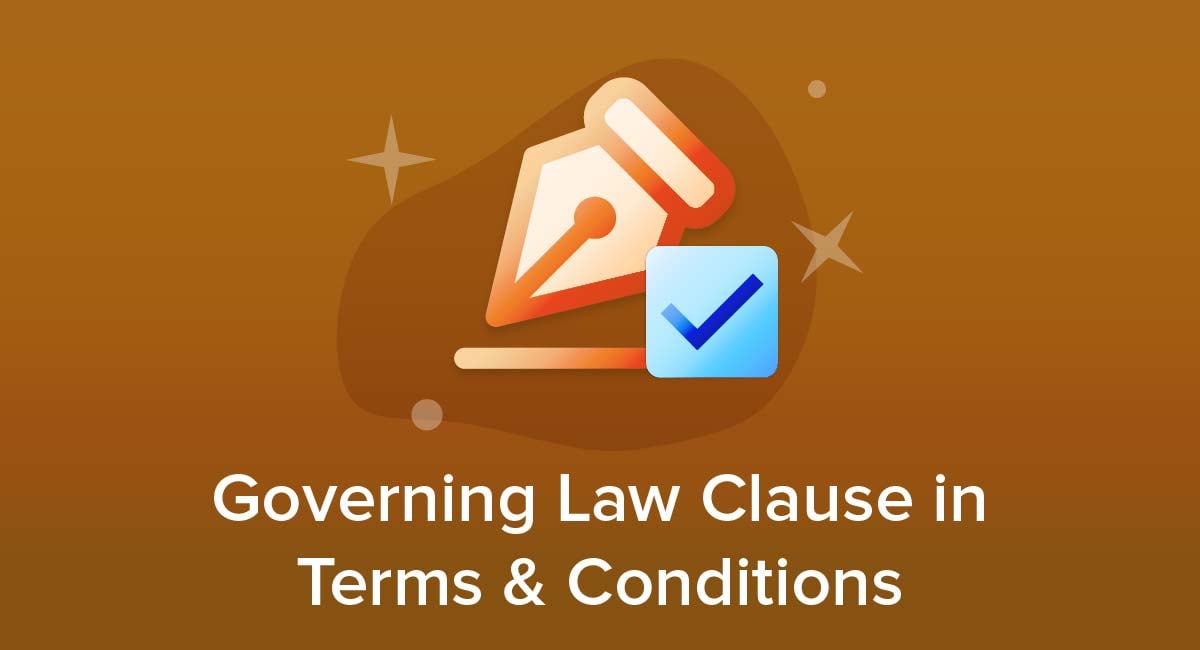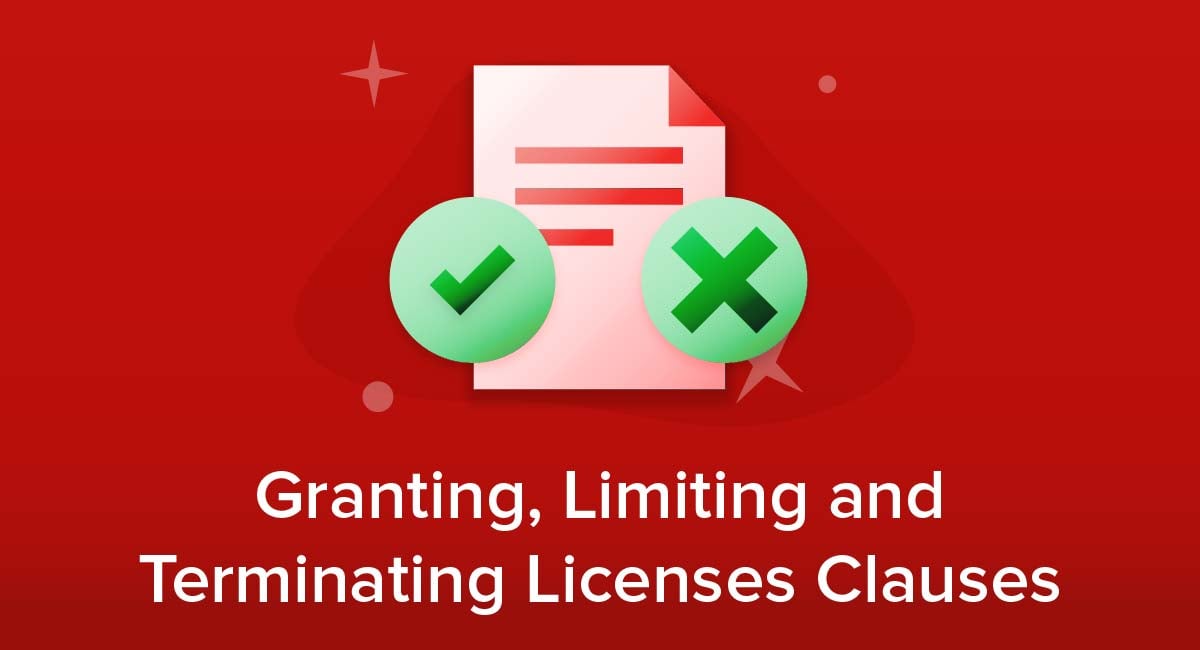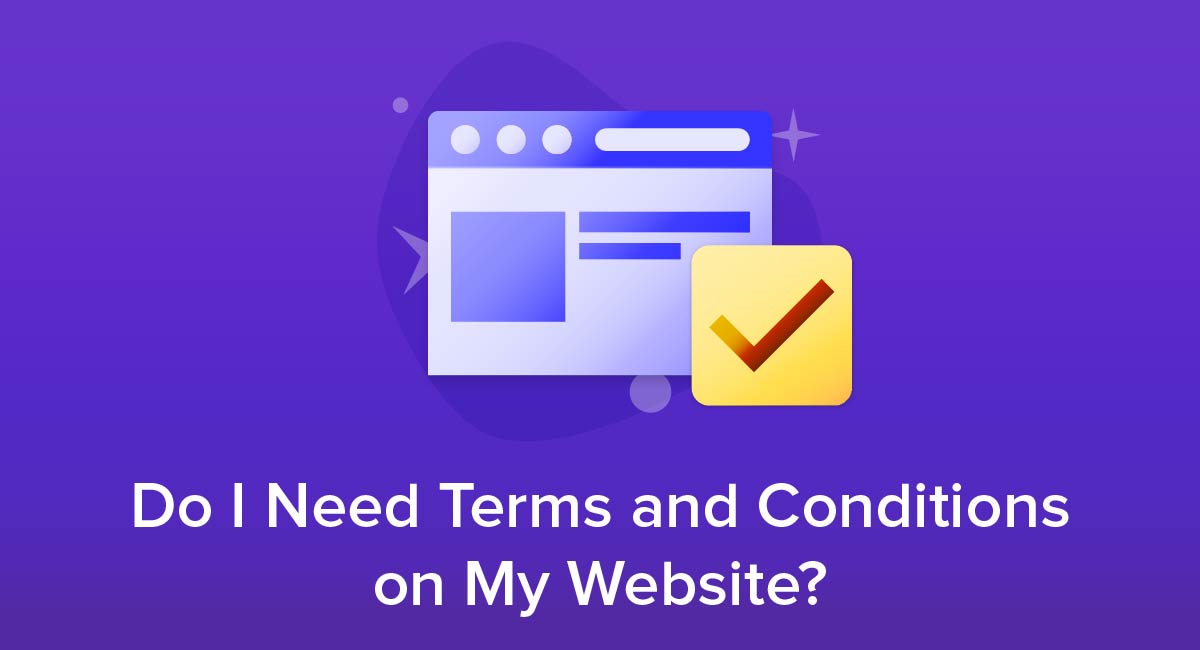
While having a Terms and Conditions agreement is not a legal requirement, having one can provide a business (and its customers) with a number of important benefits. So, while you don't technically need one, you will really, really want to have one.
This article will explain why every business should have a Terms and Conditions agreement on its website.
Our Free Terms and Conditions Generator is created to help you generate a professionally drafted agreement that can include various terms and conditions for your site and/or app.
- Start the Free Terms and Conditions Generator from our website.
- Select platforms where your Terms and Conditions will be used (website, app or both):
- Answer a few questions about your website or app information:
- Select the country:
- Answer a few questions about your business practices:
-
Enter your email address where you'd like to receive the new Free Terms and Conditions and click "Generate":
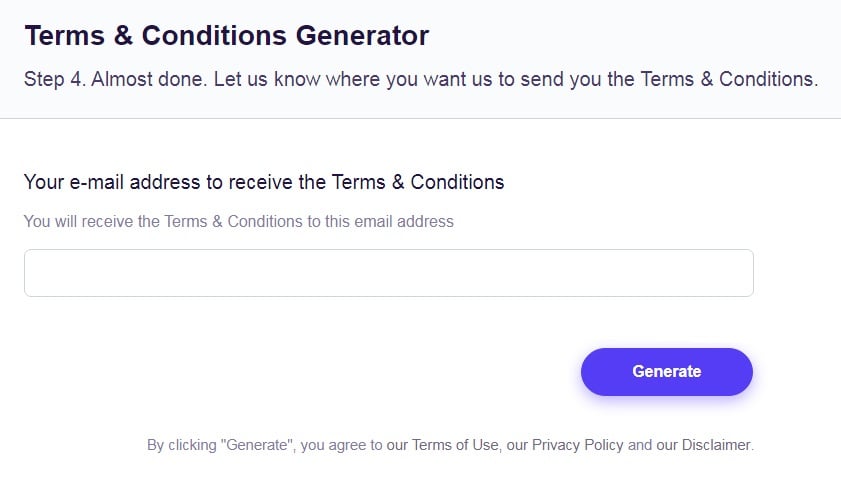
Once generated, you can copy and paste your Free Terms and Conditions agreement on your website or app or link to your hosted Free Terms and Conditions page.
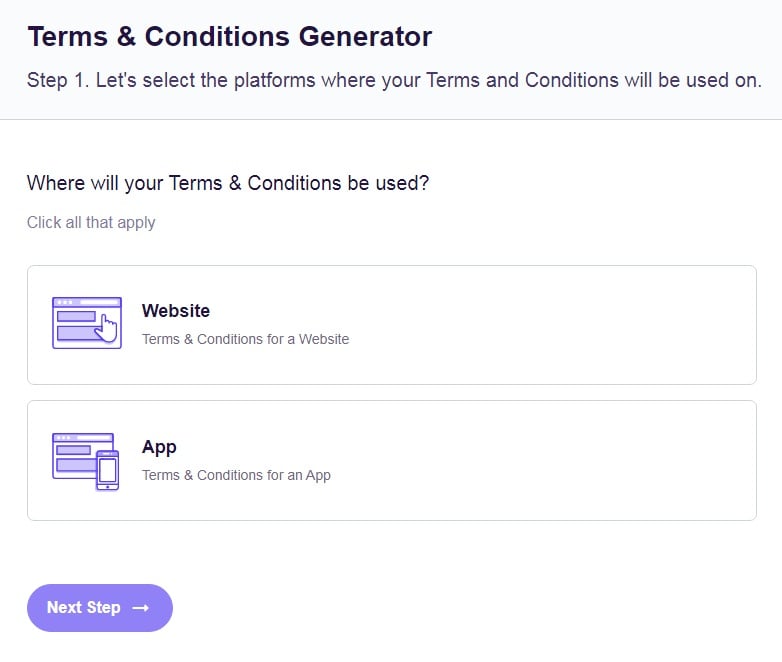
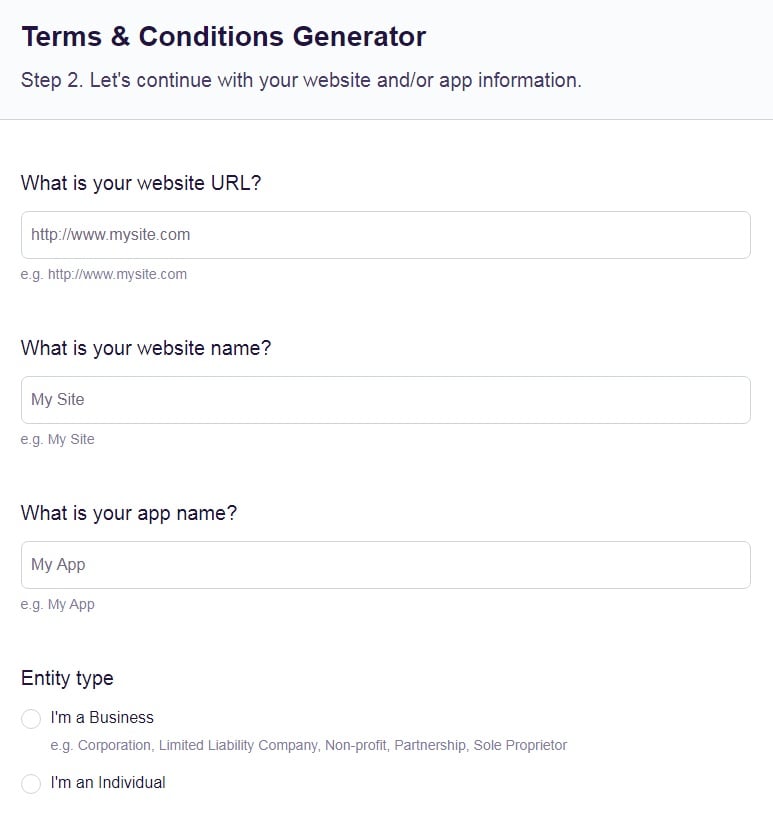
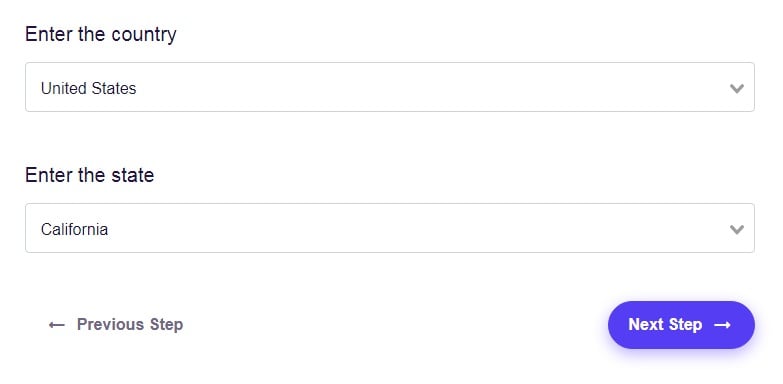
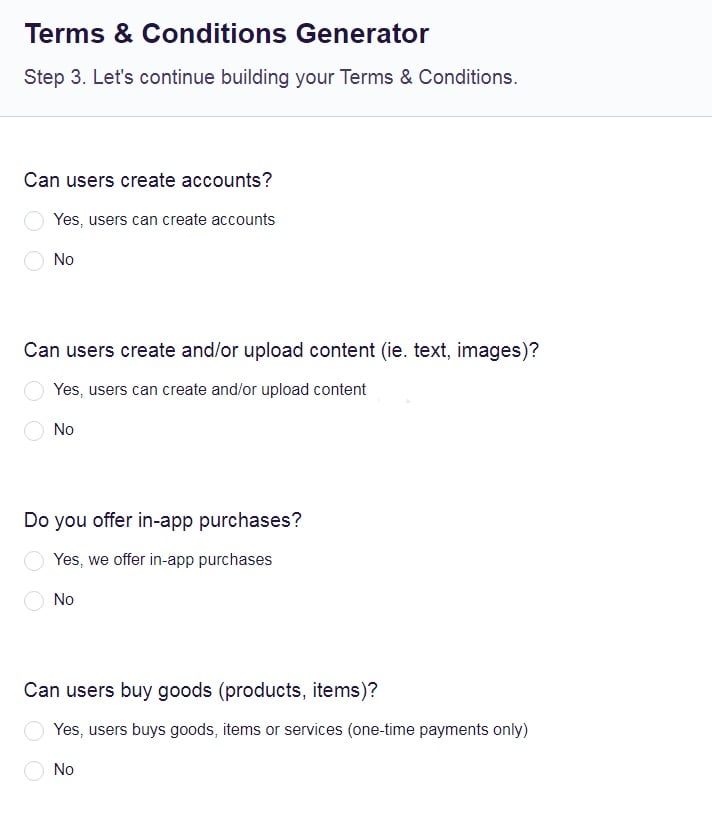
What is a Terms and Conditions Agreement?
A Terms and Conditions agreement (T&C) is a public-facing online document where you have the opportunity to inform your users of the terms they must follow when using your site or service, as well as the conditions that surround that use. You can also use your T&C to help limit your legal liability for a variety of things.
For example, your T&C can inform users about restricted behaviors when using your website, about your right to terminate abusive accounts, and about restrictions of warranties on your products (if applicable).
A Terms and Conditions agreement may also be called a Terms of Use or Terms of Service.
Let's look at a few reasons why you do "need" a Terms and Conditions agreement on your website.
Set Your Own Rules With Terms and Conditions

Your Terms and Conditions can set out rules for people to follow when they use your site. This is particularly important when you have a member/subscriber section, or you allow people to post their own content or communicate with one another.
For example, you could set out rules saying users:
- Must not post anything that breaks the law
- Must not post anything that is abusive, grossly offensive, threatening or harmful to other users
- Must not do or post anything that could damage your system or other users' devices, such as malware
- Must post under their own name only
- Must only post using one account
FINRA's Terms of Use has a clause that includes a summary of permitted uses, followed by a longer, more detailed clause for Restrictions for using the site:
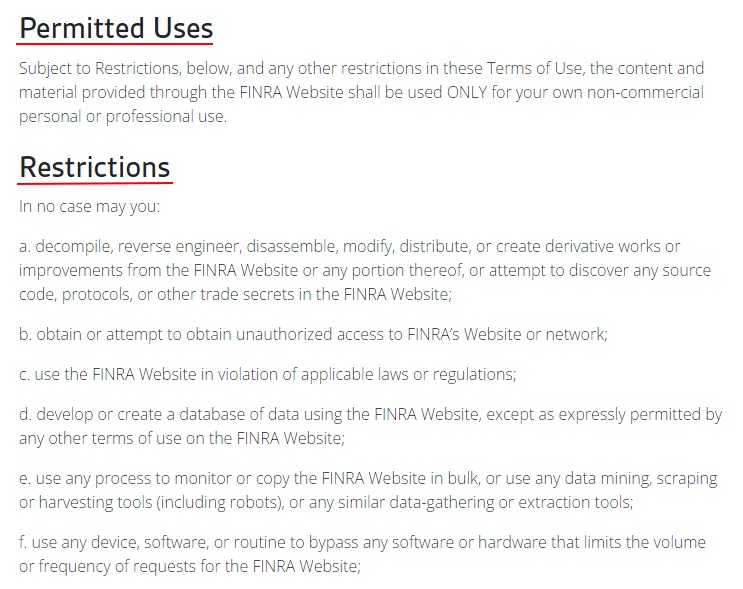
You can also spell out the consequences for breaking the rules. These could include:
- The violativer content being deleted
- A warning system such as "strikes" against the user
- A temporary ban on using the site or from specific activities on the site such as posting material
- A permanent ban from the site or particular sections and features
- Legal action or being reported to law enforcement authorities
PlayStation Network explains that it may suspend players who breach its terms:
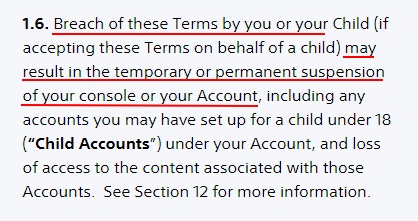
Publishing such rules won't guarantee people will follow them, but it will likely reduce rulebreaking. In some cases, users may not have realized particular actions were not allowed. In other cases, knowing the potential consequences may be a deterrence.
You may want to keep the option to close a user's account permanently. Depending on your site setup, this could mean they lose the ability to use certain features or post material, or they lose the material to access parts of your site altogether.
Doing this creates the risk that the user will complain, challenge your action or even try to make a legal claim against you, particularly if you charge for premium features or content.
Note that clearly setting out in your T&C that you have and maintain the right to suspend or close user accounts is important so users won't be able to complain or challenge it if you do close an account.
In this part of your T&C, you should clearly explain the following:
- The circumstances in which you can or may suspend or close an account
- Whether you give any warning before doing so
- Whether you offer a full or partial refund for any membership fees or subscriptions when an account is suspended or closed
- What happens to any content the user has posted through the account. (If you delete it, say whether the user gets an opportunity to download copies of the content first.)
- Whether or not the user can create a new account afterwards
Inform Users of Your Business Policies With Terms and Conditions

Depending on what industry you're in, you may have very specific business policies your users should be aware of. For example, if you run an ecommerce store, what is your standard shipping time and how do you handle refunds?
You can include all of this type of information in a Terms and Conditions agreement, which will in turn reduce questions users ask, as well as reduce legal disputes.
Having clear, easy to read Terms and Conditions can help customers find the answers to questions they may have. This reduces the need for your staff to spend time and effort dealing with such questions, freeing them up for other work.
Many legal disputes break out because one side misunderstood part of an agreement or was left to make an assumption or interpretation. The problem is that even if a court agrees with your understanding and rules in your favor, you will often have spent time, effort, mental energy and money dealing with the case. You may also have built up ill-will with customers.
Having clear and comprehensive Terms and Conditions can reduce such misunderstandings and leave customers and users able to make an informed decision about whether to use your site or service, or to make a purchase. In turn, you'll be less likely to get into a legal dispute.
Some examples of the types of useful business practice information you can cover in your T&C are:
- Pricing issues such as taxes, currencies and shipping costs
- Payment terms such as due date, late payment charges and whether you require payment before despatch or delivery
- Your policy on returns and refunds
- What types of warranties you offer on your products
Making these points clear helps with customer satisfaction, as they know what to expect when interacting with your site or service.
Here's an example of how Kerry sets out clear payment terms that addresses how invoices must be paid, in what timeframe, and what may occur if payment is not received:

The details and extent of these types of clauses will vary depending on the industry and complexity of your site or service. But in general, most websites will need a place to disclose business practices and a T&C is the perfect place to do this.
Limit Your Legal Liability With Terms and Conditions

Depending on the jurisdiction, users and customers may make certain assumptions about their legal rights and responsibilities. The law may also say some rights and responsibilities exist by default unless you say otherwise. Your Terms and Conditions are a good opportunity to establish more control over how these rights and responsibilities work.
The most common points to consider are:
- Your liability for any damage that your products, services or site cause. This could be physical harm, property damage, damage to a computer and financial damage or loss.
- Warranties about your products or services. In this context a warranty is a promise, for example that your goods are fault-free or perform a particular function. Some warranties are implied, meaning users and customers can assume the warranty exists unless you say otherwise.
In your Terms and Conditions, you can use two legal statements to boost your position:
- A limitation of liability clause says that you are only liable for particular things. Often this will mean you are saying you aren't liable for anything unless you specifically list it, or it's required by law.
- A warranty disclaimer says that you aren't making any warranties except those you've specifically listed.
JRNI has a very well-written, well-organized limitation of liability clause:
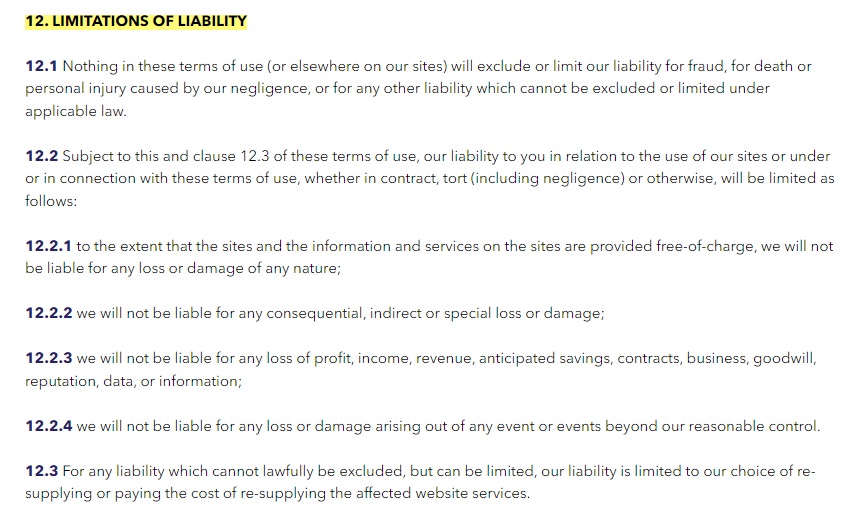
And here's an example of a standard warranty disclaimer clause from MFS:

While these statements are usually legally effective if the user customer has had a reasonable opportunity to see them and agree (implicitly or explicitly) to them, some jurisdictions limit such statements. For example, in many places you can always be held liable for damage caused by your negligence, or be treated as making a warranty that goods are in working condition, regardless of what your terms and conditions say.
Because of these rules, businesses often use terms such as "to the fullest extent allowed by the law" when describing their limitation of liability or warranty disclaimer. Some will say that if a court rules a particular part of these clauses is not allowed, the rest of the terms and conditions remain valid and in force.
MessageBird explains that its warranty disclaimer doesn't go beyond what the law allows:
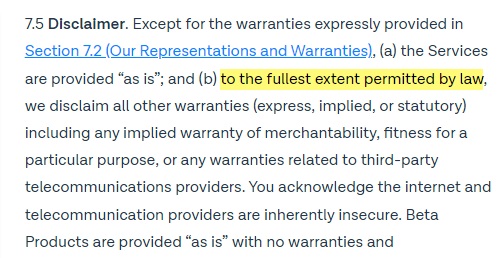
While clear Terms and Conditions reduces the chances of a legal dispute, it doesn't remove it completely. If you or a user/customer wants to pursue a legal case against one another, the first issue at stake is often which laws apply and how the case proceeds. This can be unclear, particularly if you and the customer are in different places, if the case involves online activity, or if you ship orders from a different location to your business's registered base.
In your Terms and Conditions, you can set out:
- Governing law: Which country or region's laws apply to your dealings with the user/customer
- Jurisdiction: Which country or region's court system should handle any case
- Whether you must go through a particular resolution process such as arbitration, independent adjudication or a regulator before going to court.
Snap clearly sets out the governing law and jurisdiction (venue) for any legal dispute:
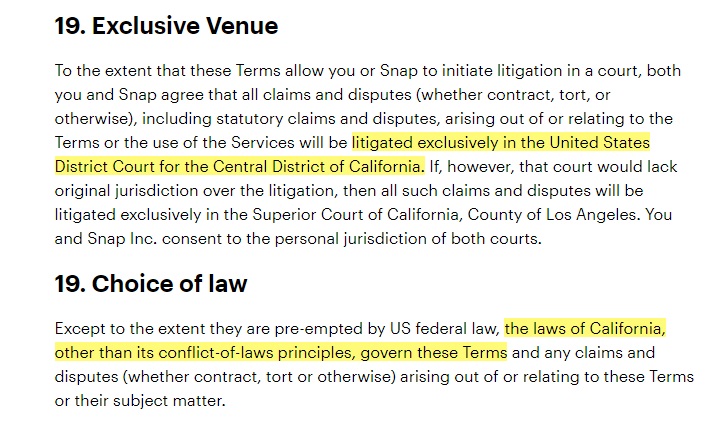
You should choose a governing law and jurisdiction that has some logical connection to you, the customer or the transaction itself. For example, choose where your business is incorporated, or where most of your customers live.
Protect Intellectual Property Rights With Terms and Conditions

Whenever you post proprietary material on your site, or if you allow users to post their own material, you need to account for intellectual property rights of the created materials. In other words, who owns the content and what rights, if any, are given to anyone else besides the owner.
Depending on your site, your Terms and Conditions could establish:
- You own the intellectual property rights in regard to the material you post on your site
- Whether you allow users to reproduce the material and with what limitations
- Users are not allowed to post anything that infringes a third party's intellectual property
- What happens with the intellectual property of anything users post. (For example, you may ask users to grant a licence for you to use it, or to surrender their rights completely.)
Here's how the Washington Post asserts that its services are protected by copyright, and that any use of its materials is prohibited except in limited circumstances outlined in the clause:
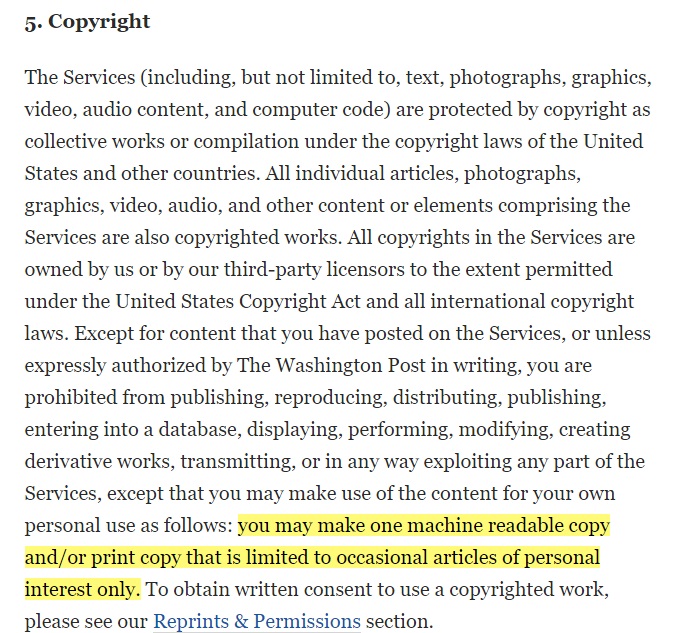
Summary
Let's recap what you need to know about why you need a Terms and Conditions agreement on your website.
- Having one has many benefits for both you and your users
- Terms and Conditions can establish rules for using your site, as well as what the penalties are for violating your terms.
- Clear Terms and Conditions can make your life easier by reducing questions and potential legal disputes.
-
You can use Terms and Conditions to reduce legal risks by:
- Limiting your liability
- Disclaiming warranties
- Protecting (and respecting) intellectual property rights
- Determining where any legal cases take place, under which laws, and whether you require arbitration or dispute resolution before cases go to court
